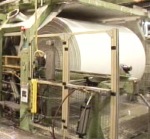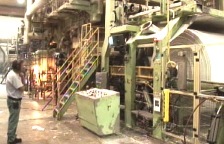
Tissue Manufacturer's Legacy Nothing to Sneeze At
- By Aaron Berstler
- Oct 19, 2010
Paper manufacturing has always been a resource-intensive business, consuming vast amounts of water, fiber and energy as well as some chemicals. Making paper is an elaborate process of pulping, cleaning, de-inking, draining, drying, processing, packaging and transporting.
But the way the industry manages the business has changed dramatically over the years. Consider this: the office paper in your printer and photocopier was recycled six times on average.
How can the industry’s largest segments – towel and tissue paper – compete in this arena? Towel and tissue paper typically are single-use products that are landfilled or flushed into sewer systems after use, offering little opportunity to recover their environmental value. Cascades Tissue Group of Kingsey Falls, Quebec has answered this "green dilemma" by reusing feedstock resources and reducing manufacturing inputs.
With its roots deeply grounded in the recycling and creative re-use of materials, the company has been intersecting resource innovation with resource minimization for more than 40 years. In 1964, Alain, Bernard, and Laurent Lemaire, three brothers from Quebec, began collecting and recycling thrown-out goods. Little-by-little, they began buying and transforming paper mills, keeping with the original recycling-focused vision and growing the business to 12,000 employees and more than 100 operating units in North America and Europe. Alain Lemaire is Cascades Inc.’s president and CEO. Suzanne Blanchet serves as president and CEO of the Cascades Tissue Group division.
More recently the company launched its North River® brand, which is composed of 100 percent recycled fiber from post-consumer content, meaning that no freshly cut trees (also known as virgin fiber) were used in their manufacture. Instead, the feedstock comes from the “urban forest” – used office paper and corrugated boxes. The brand also is the only North American tissue to be Certified Processed Chlorine-Free (PCF) recognized by the Chlorine Free Products Association (CFPA. Its water use, reduced 41 percent since 2002 to a low 10 cubic meters of water per ton of paper made, is 80 percent lower than the North American paper industry average.
To better manage another of its manufacturing inputs, Cascades Tissue Group uses 100 percent Green-e certified wind energy. The company purchases Green-e certified renewable energy credits equivalent to 20,000 megawatt-hours (MWh) annually, avoiding 43 million pounds of carbon dioxide emissions per year.
All told, the company estimates that the purchase of 100 cases of North River towel or tissue products (22 pounds net weight) will typically save, on average, the following resources in comparison to competitive products made from virgin fiber sources:
- 19 trees,
- 1,918 pounds of carbon dioxide emissions, and
- almost 18,000 gallons of water.

Additionally, the product quality and cost gaps that once existed between virgin fiber-based products and green products have now evened out. Technology advances have made virgin vs. recycled towel and tissue products virtually indistinguishable from one another, and the cost savings from using less fiber, less water and less energy in the recycled paper manufacturing process has resulted in a price-competitive marketplace.
"People don’t often think about disposable paper as an ecological issue, so we are trying to educate our customers to consider the environmental factors of this one-time-use paper," said Steve Ott, sustainable business development manager at Cascades Tissue Group. "When tissue paper is manufactured utilizing virgin fiber, it is all the more resource intensive due to the pulping process that is very chemical, water and energy-dependent."
Its commitment to education has allowed Cascades Tissue Group to engage deeper into sustainable initiatives. The company publishes annual sustainability reports and is developing a first-of-its-kind sustainable development plan that scrutinizes every process and procedure in papermaking and aspires to be a blueprint for other organizations looking to institutionalize commitments to the environment and their communities.
The company is elevating its accountability with 18 measurable and quantifiable performance indicators in its sustainable development plan. Created in conjunction with various nongovernmental organizations, these key areas of focus encompass environment, social, economic and governance issues and include:
- responsible purchasing,
- ethical sourcing practices,
- climate change,
- ongoing energy efficiency programs,
- water reduction,
- beneficial use of waste fiber,
- sustainable development training and
- community involvement.
The sustainable development plan roll-out coincides with the launch of a program intended to facilitate consultation with customers similarly interested in starting their own sustainable development plans. Though challenges come with projects of this nature, which invite professional scrutiny, the view that “green business is good business” prevails and the company believes that the effort will positively motivate and enhance productivity and best practices.
Cascades hopes that its call to action will be followed not only by others in the industry, but by end users as well.
Cascades Tissue Group In Profile
Cascades Tissue Group is publicly held, trading on the Toronto Stock Exchange under the symbol CAS. The company headquarters is in Candiac. It employs approximately 2,000 of Cascades Inc’s 12,400 employees.
Steve Ott, the company's Sustainable Business Development manager for the Away-From-Home Division, provided answers to these In Profile questions. He is regularly involved in environmental decision-making and has been with the company for more than 4 years.
What is your company's primary activity? What is its mission?
Cascades Tissue Group, a business unit of Cascades, Inc., manufactures and converts tissue products (facial and bathroom), paper towels, and paper napkins for the commercial and retail markets. Motivated by the principles of sustainable development, Cascades Tissue and its 17 North American plants offer a wide range of sustainably manufactured tissue products throughout North America. Whether for recycling materials, re-using waste, improving water and air quality or energy efficiency, the company aims to not only surpass the current environmental standards but also create new manufacturing precedents for the future.
The company's facilities are located in:
Mechanicville and Waterford, N.Y.
Rockingham, N.C.
Kingsey Falls, Candiac, Lachute, and Laval, Quebec
Pittston and Ransom, Pa.
Eau Claire, Wis.
Memphis and Brownsville, Tenn.
St. Helens, Ore.
Kingman, Ariz.
Whitby and Scarborough, Ontario
Customers and competition
The division serves the away-from-home market, including office buildings, secondary and higher education, health care, hospitality, government and more.
It is the fourth largest producer of towel and tissue paper in North America. Principal competitors include Kimberly-Clark, Georgia Pacific, Wausau Paper and SCA.
Does your company have any recent environmental certifications?
Cascades Tissue is Fair Trade Certified, and 99 percent of its complete line meets EPA CPG guidelines for recycled content. Its products hold a multitude of eco-labels from a wide variety of organizations. Its signature North River line of bathroom tissue, napkins, hand towels and wipers have been certified by Green Seal, and TerraChoice’s EcoLogo/Environmental Choice designation.
What is your company's average revenue over 2007-2009?
$4 billion (corporate)
What is your company's average operating cost during that time?
$3.75 billion
What makes your company different from others in this field?
For commercial purchasers of towel and tissue papers, Cascades Tissue Group offers a product line that exceeds the industry’s sustainability standards, thereby helping to lessen the overall environmental footprint. It also provides the most comprehensive line of sustainable products that are often on the leading edge of innovation and a collaborative partnership approach like no other that provides customers’ greater profit and growth opportunities.
What are the tools you use to keep up with regulatory changes and stay in compliance (software, monitoring devices, etc.?)?
Each mill is equipped with sophisticated gauges and technologies (for instance, in-plant water recycling systems that track the amount of water used for every ton of manufactured product.) Mills individually monitor and report all data to Cascades environment department, and everything is summarized annually in Cascades Report on Sustainable Development, which is available at www2.cascades.com/en/page/report-sustainable-development
What environmental regulations must your company comply with?
As an owner and operator of numerous paper mills, Cascades Tissue Group must comply with the Clean Air Act, the Clean Water Act, the Safe Drinking Water Act and the Solid Wastes Disposal Act, among others, in the United States.
Please describe how your company meets its environmental and related challenges.
Cascades has an environment, health and safety committee consisting of two independent directors and one non-independent director. They are responsible for assessing the company’s environmental, health and safety performance against the framework of industry standards and applicable laws and regulations.
About the Author
Aaron Berstler is account director with Kohnstamm Communications in St. Paul, Minn.